When a grill flare-up or bbq grill grease fire happens, it can be quite frightening. Most people are often caught off guard, increasing their risk of injury from the gas grill fire. While gas grill flare-ups may seem severe, they are manageable if you’re prepared to handle them. Follow these instructions to stay safe and keep your grilling experience enjoyable.
Common Causes of BBQ Grill Fires
While grease buildup on grills can cause fires, it’s not the only culprit. Placing outdoor BBQ grills in risky areas—like too close to your home, deck railings, outdoor sheds, or under patio awnings—is a common mistake. Make sure there are no obstacles, such as patio awnings or tree branches, that could ignite while you’re grilling.
Clean-Up
Cleaning your grill is the first step in preventing grease fires and flare-ups. Grease fires occur when containers are overflowing and the oil or grease has reached its highest temperature.
Inspect these removable pans and trays weekly, or more often if you use the grill frequently. Scrape off any oil or dried debris, dispose of it properly, and soak the drip pan in warm water to clean it thoroughly.
Prevention is Key
Always perform DIY grill cleaning services and brush the grill grates after each use. Additionally, empty your drip pan regularly or ensure it hasn’t reached the point where it might catch fire. This often-overlooked step is crucial for preventing fires.
Avoid Using Water
Water and fat oil do not mix well, and using water on grease fires can exacerbate the problem. Avoid putting water on grease fires, as the fat from the food can cause the fire to spread.
Two-Zone Method
A two-zone gas grill fire setup can help control flare-ups. Move flammable food to the no-flare-up zone to prevent igniting the fire. Once the flare-up has subsided, reposition the food onto the coals and continue cooking. Keep a constant eye on the meal to prevent future flare-ups.
Cover-and-Wait Method
If you don’t have a two-zone setup or if the flames are too dangerous, use the cover-and-wait method. Since fire needs oxygen to thrive, cutting off the oxygen supply will extinguish the flames. When you see a flare-up, quickly cover the grill and monitor the flames through the air vents. Once the flare-up subsides, it’s safe to uncover and resume cooking.
Managing Flare-Ups
It’s essential to gauge how big and long the flare-up will last, as there’s a fine line between charred and burnt. Understand the fat content in the food you’re grilling and decide if it will fuel the flare-up or cause it to subside. If unsure, move the food away from the flare-up. Foods with sugar-based sauces or delicate spice rubs require quick intervention to prevent burning.
Build the Right Size Fire
When using charcoal or wood as fuel, there’s no need to create an enormous fire. Avoid using the entire bag of briquettes for a few steaks. Match the fuel quantity to the size of the fire needed for what you’re grilling.
Fire Management
Flare-ups are common when grilling with charcoal. Controlling the amount of fire is essential to prevent unexpected hot spots when fat touches the coals.
Stay Out of the Wind
Wind can drive oxygen into the fire, increasing the risk of flare-ups. Grilling in windy conditions makes it harder to control the flames. Try to find a sheltered area to grill, reducing the likelihood of flare-ups.

Disaster Recovery
After extinguishing the flames, ensure your grill is thoroughly cleaned to remove any cooked-on oil, residue, and fire extinguisher debris. Clean the bbq grill grease catcher or drip tray meticulously. Removing this buildup significantly reduces the chances of another grease fire.
By following these tips, you can handle and prevent BBQ grill fires effectively. Stay prepared, keep your grill clean, and enjoy safe and delicious grilling experiences.
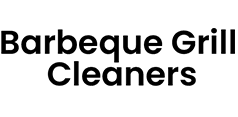
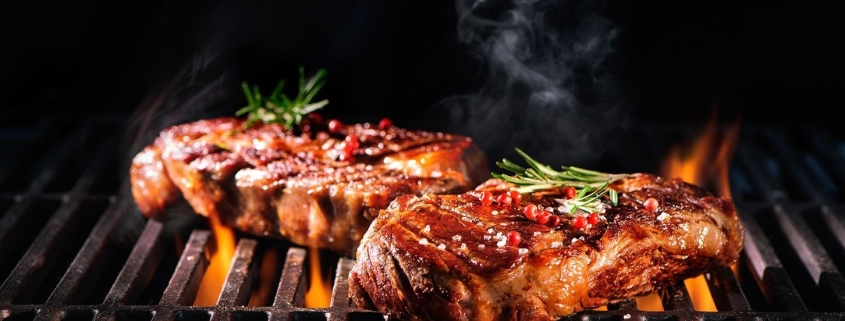
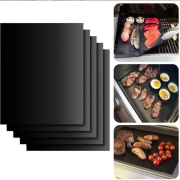
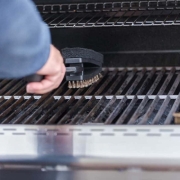
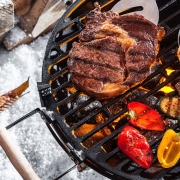
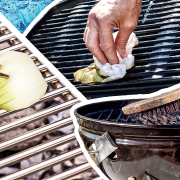
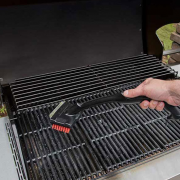



Leave a Reply
Want to join the discussion?Feel free to contribute!